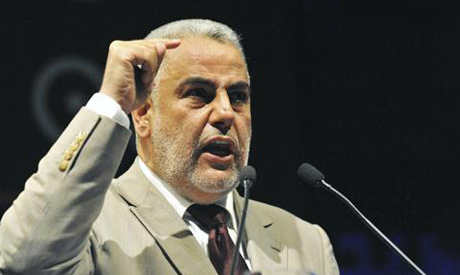
Morocco's Premier and head of the Justice and Development Party Abdelilah Benkirane speaks in Rabat July 14, 2012 (Photo: Reuters)
Morocco's ruling Islamists are in need of a new ally after their main coalition partners made good on their threat to quit the government, raising the possiblity of early elections.
The Party of Justice and Development (PJD) shot to power for the first time after triumphing in parliamentary polls held in 2011 as one of the democratic measures offered by the monarchy in response to Arab Spring protests sweeping Morocco.
But key coalition partner, the nationalist Istiqlal Party, which held several ministerial portfolios including education and the economy, said in May that it planned to resign over the PJD's failure to shore up the economy and solve pressing social problems.
It finally did so after the return from a private holiday in France of King Mohammed IV, who had urged the party to go back on its decision.
On Tuesday, five out of six Istiqlal ministers submitted their resignations barring education minister Mohamed El-Ouafa who held on his portfolio forcing the party to suspend him, party spokesman Adil Benhamza told AFP.
To hold on to the reins of power, as other Islamist parties in the region have struggled to do, the PJD is now faced with two choices, according to political analyst Mohamed Darif.
A cabinet reshuffle would be the most obvious short-term solution but the alternative is to call fresh elections, "in order to secure a new majority in the polls," Darif told AFP.
The PJD's leadership will meet on Saturday to decide its next step, but Darif says the likeliest scenario is a reshuffle, "which means a new coalition with one or two new parties" to fill the 60 seats held by Istiqlal in Morocco's House of Representatives.
Local press reports indicate that talks have already begun with the National Rally of Independents, which has 52 seats in parliament.
But such an alliance could turn out to be a mismatch, Darif argues.
"The RNI is a party that voted against the government programme drawn up by the Islamists. Going along with it now would go down badly" with its supporters, he says.
If the RNI were to join the Islamists, the government programme adopted in January 2012 would have to pass again through parliament.
But the ruling coalition's prospects couldn't get much worse than they have been in recent months, when the rivalry between Istiqlal's leader Hamid Chabat and Islamist Prime Minister Abdelilah Benkirane frequently spilled into the open.
When it announced its decision to pull out of the coalition, Chabat's party, which led the previous ruling alliance, accused the Islamists of inaction and of monopolising decisions.
The political deadlock has prompted fears of government paralysis at a time when Morocco is under pressure to implement much-needed social reforms, notably on costly subsidies, and to fix its ailing public finances.
The country last year faced a budget deficit of more than seven percent of GDP.
Some within the PJD appear to favour the option of new elections.
"It would clear up the situation completely and it is also the wish of some of our party leaders," Abdelaziz Aftati, a lawmaker from the Islamist party told AFP.
The PJD's popularity is undeniable, with a recent opinion poll showing Benkirane still having widespread support among the electorate.
Short link: